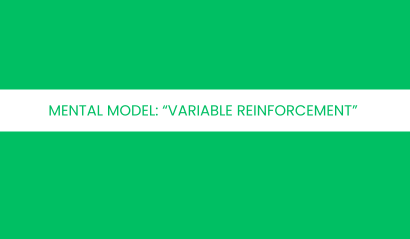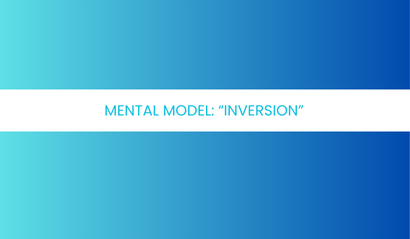Mental Model: Social Proof
Have you ever chosen a restaurant because it had a long queue outside while another nearby eatery remained empty? Have you ever bought a product simply because it had thousands of positive reviews? If so, you’ve experienced the psychological phenomenon known as social proof. This principle plays a massive role in how we make decisions, often without realizing it.
In this blog, we will explore the origins of social proof, how it works, real-world examples, and ways to avoid blindly following the crowd.
The Origin of Social Proof
The term social proof was coined by psychologist Robert Cialdini in his 1984 book Influence: The Psychology of Persuasion. Cialdini described social proof as one of the six fundamental principles of persuasion, explaining how people often look to others for guidance when they are uncertain about how to behave in a particular situation.
However, social proof is not a modern invention. It is deeply embedded in human evolution. Early humans depended on group behavior for survival—if others in the tribe ran away from danger, it was wise to do the same without questioning. Over time, this instinct became an essential part of human psychology, influencing decision-making in everything from social interactions to consumer behavior.
How Social Proof Works
Social proof operates on the idea that people assume the actions of others reflect the correct behavior for a given situation. The psychological mechanism behind social proof can be broken down into several key factors:
- Uncertainty: When people are unsure about what to do, they look at others for cues.
- Similarity: We are more likely to follow people who are similar to us in background, interests, or behavior.
- Number of People: The larger the number of people following a particular behavior, the more likely others are to join in.
- Authority: If an expert or celebrity endorses something, people assume it must be good.
- FOMO (Fear of Missing Out): People don’t want to feel left out, so they often follow the crowd to stay relevant.
These factors create a powerful psychological effect, making social proof a key element in marketing, decision-making, and everyday life.
Examples of Social Proof in Action
Social proof manifests in various ways across different industries. Let’s look at some common examples:
1. Product Reviews and Ratings
Online shopping platforms like Amazon, Flipkart, and eBay thrive on social proof. A product with thousands of positive reviews seems more trustworthy than one with just a few ratings. Consumers rely heavily on these reviews before making a purchase.
2. Testimonials and Case Studies
Businesses use customer testimonials and case studies to convince potential buyers that their products or services are effective. Seeing other customers benefit from a product influences new customers to trust the brand.
3. Celebrity Endorsements and Influencer Marketing
When celebrities or influencers endorse a product, their followers are more likely to purchase it. For example, when Cristiano Ronaldo is seen wearing a particular brand of sportswear, fans are influenced to buy the same brand.
4. Social Media Engagement
Social media thrives on social proof. A post with thousands of likes, shares, and comments appears more credible, leading even more people to engage with it. This is why businesses focus on getting influencers to promote their products.
5. “Bestseller” Labels and Scarcity Marketing
Retailers often mark products as “bestsellers” or “trending” to leverage social proof. Limited-time offers, “Only 2 left in stock” messages, and “Over 10,000 sold” claims push consumers to act fast.
6. Group Behavior in Public Places
If you’re in a new city and see a long line outside a restaurant, you might assume it’s good and join the queue. This is social proof in action—people equate popularity with quality.
7. News and Media Influence
News coverage can also create social proof. If a product or movement is frequently mentioned in media, people assume it’s important and worth their attention.
The Dark Side of Social Proof
While social proof can be helpful, it also has a dark side. People may blindly follow trends, make impulsive decisions, or fall for scams due to social proof. Here are some risks:
1. Herd Mentality and Irrational Decisions
During stock market booms and crashes, people often follow the crowd without doing proper research. The 2008 financial crisis was partly fueled by herd mentality in real estate investments.
2. Fake Reviews and Manipulation
Companies sometimes post fake reviews to manipulate public perception. This is why some platforms, like Amazon, have strict policies against fake reviews.
3. Peer Pressure and Unethical Behavior
Social proof can lead people to make poor choices, such as substance abuse, reckless spending, or unethical behavior, just because they see others doing it.
4. Misinformation and Viral Hoaxes
False information spreads quickly when many people share it without verifying facts. Social media hoaxes and conspiracy theories often gain traction through social proof.
How to Avoid the Negative Effects of Social Proof
While social proof can be beneficial, blindly following the crowd isn’t always the best decision. Here’s how to be more mindful:
1. Think Critically Before Following Trends
Just because something is popular doesn’t mean it’s good for you. Ask yourself: “Is this truly valuable, or am I just following the crowd?”
2. Verify Information
Before believing a viral post, check reputable sources. Cross-check reviews before buying a product to avoid falling for fake ratings.
3. Trust but Verify Reviews
Read both positive and negative reviews. Be cautious of overly enthusiastic testimonials that seem too good to be true.
4. Follow Experts, Not Just Popular Opinions
In areas like finance, health, and career advice, listen to experts rather than just influencers or celebrities.
5. Avoid Emotional Decision-Making
Many marketing strategies use urgency and FOMO to trigger impulse decisions. Take a step back, analyze your needs, and decide rationally.
Conclusion
Social proof is a powerful psychological tool that influences how we think, shop, and make decisions. While it can be beneficial—helping us discover great products, trustworthy services, and valuable content—it can also lead us to make irrational choices if we’re not careful.
By being aware of how social proof works and staying mindful of our decisions, we can use it to our advantage rather than falling prey to its negative effects. Next time you find yourself following the crowd, take a moment to ask: “Am I making this choice because it’s truly the best option, or just because everyone else is doing it?”
Being mindful of social proof will help you become a smarter consumer and a more independent thinker!







